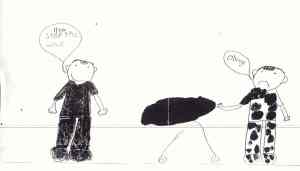(With war drums beating in Europe and around the world, I’m thinking of the large wars that make the headlines and the small personal battles that happen every day. It seems like a good time to repost this.)
Driving to a school program today, Liz and I suddenly and surprisingly found ourselves in the middle of a heated exchange about the appropriateness of a particular story for a group of teenagers. When Liz offered her take, it made no sense to me and I sensed VICTORY. I countered with a dismissive, “but, but, but how how could you possibly think that?” Liz didn’t miss a beat. “You’re right!” she said. “I disagree with my previous statement!” What a wonderful example of what we call the Practice of Nevermind- the ability to change your mind without feeling threatened, to let go of hardened positions and the heat that is generated in defending them. Full disclosure folks… Liz is far more accomplished at this. I have much to learn!
We laughed and remembered an incredible teaching by a second grader of ours years ago whose name we have unfortunately forgotten. 200 of our students were creating messages for United Nations diplomats who had come to Muir Woods in California to celebrate the signing of the United Nations Charter 50 years ago. The students tied their Peace Scrolls to the ancient redwoods and the diplomats walked at sunset into the woods. Each one left with a scroll. I found a copy of this scroll this afternoon. Here it is. The wisdom and hope of a child- a profound lesson in letting go. A challenge to us all. I hope that this image will be widely distributed! Let’s Stop the Wars-the ones as close as our own homes…the ones in far off lands. Okay? OKAY!

Bob, again a wonderful post that gets me thinking. I was reading this morning about Peter Elbow’s work with the “Believing Game”. What if, instead of bringing our doubting, i.e. critical thinking to every disagreement, instead we took on the perspective of other with total belief. How might that broaden our perspective, help us find more of a middle ground to meet, at the very least develop compassion for the position of the other? Perhaps getting to a mutual “okay” involves full immersion in the opposite belief first. What a challenge for us all! Go Liz!
okay?
okay. yes, okay.